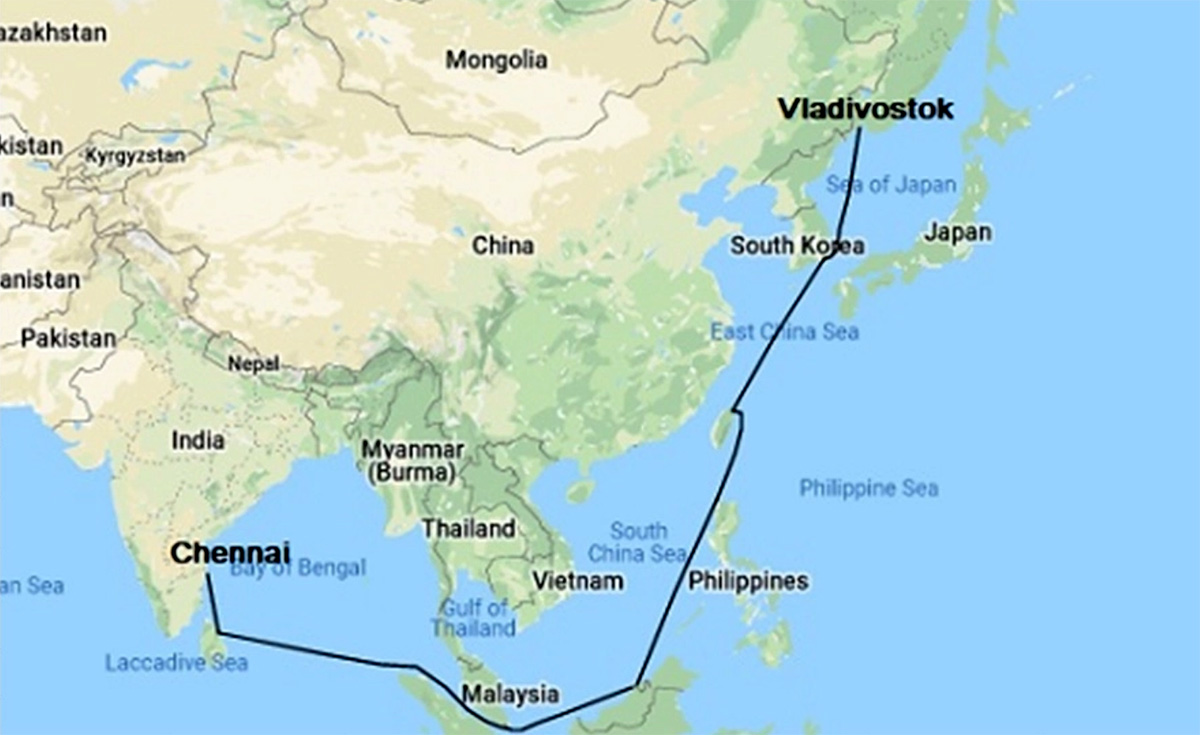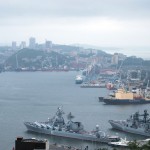It’s the season for new corridors. As tensions in West Asia create logistical nightmares for global trade, the prospects for the 10,300-kilometre Chennai-Vladivostok Maritime Corridor connecting Russia’s Far East and Southeastern India have revived, with the hope of bilateral benefit.
This corridor was proposed in September 2019 when Prime Minister Narendra Modi visited Vladivostok for the Eastern Economic Forum and the two countries signed an MoU to develop a sea route between the Indian port of Chennai and Vladivostok, to transport coal, oil, liquefied natural gas, fertilisers, containers and other types of cargo which are already part of the bilateral trade. It also conceives of ships calling at other Russian and international ports. Not much has moved in five years, as the pandemic halted any potential progress until 2022, and then the Ukraine conflict took away both attention and resources, but now, in 2024, this route is again in focus. Anatoly Bobrakov, Russia’s Deputy Minister for the Development of the Far East and the Arctic, was in Chennai on January 25 for the India-Russia Workshop on Operationalisation of the Eastern Maritime Corridor, a seminar that was organised by the Chennai Port Authority. “Today it takes 40 days for cargo to reach Russia through the Suez Canal, but through the eastern corridor, the time will be reduced by 40% to 24 days,” he said.
There is now considerable interest in this plan on both the Indian and Russian sides. More than 100 participants from Indian companies and the government were present. Bobrakov, who was also in India for the 2024 Vibrant Gujarat Summit, said the onus for the success of this corridor lay with the private players in both countries. Governments, he said, will monitor the negotiations between Russian and Indian companies, especially with regard to interest by private Indian players for the import of Russian goods. “Then we, as governments, will make appropriate decisions,” he added.[1]

Sarbananda Sonowal, Indian Minister of Ports, Shipping and Waterways, was also[2] in Chennai, and explained that the Eastern Maritime Corridor’s saving of 5,608 km compared to the Suez route, will “reduce logistics costs immensely, and boost efficiency in transportation of cargo between the two countries.” Increased volumes will enhance the viability of the corridor and open much-needed new and fresh opportunities between the countries.
In 2022-23, India imported 56 million tonnes of coking coal[3], an essential raw material for the manufacture of steel largely, from Australia, the U.S. and Canada. Russian coking coal is of equivalent quality as the West and there is also a price advantage. In January 2024 Moscow lifted exchange-rate linked export duties on most coal exports[4], making Russian coking coal $12 per tonne cheaper than its Australian counterparts.
Another product that India imports from Russia is fertilisers. In 2022-23, India bought 4.35 million metric tonnes of fertilisers from Russia, but discounted rates came to an end in August 2023, and Indian importers had to pay market prices.[5] The immediate impact of this price rise on Indian imports is not clear for now. Given the volatility in West Asia, India is unlikely to look at Saudi Arabia and Morocco at the moment as alternatives. Besides, the quality of Russian phosphate-based fertilizers is hard to beat and participants at the Chennai seminar were clear that bringing these products via the eastern corridor would prove beneficial. Sunil Paliwal, Chairman of the Chennai Port Trust, went a step further, suggesting that Russia could consider establishing fertiliser plants in its Far East for exports meant specifically for India.
Russia-India bilateral trade is currently at $46.2 billion, and as External Affairs Minister S. Jaishankar said when he visited Moscow in the last week of 2023, he expected it to top $50 billion this year. Trade is, however, heavily skewed in Moscow’s favour: of the $46.2 billion, India had a deficit of $43 billion with Russia.
If imports via the corridor increase, as is expected, the deficit will only widen, unless the flow of goods is two-way. There are several options to balance this out. For example, the price of eggs in Russia has risen by over 40% last year. The Namakkal district[6] in Tamil Nadu, called the “land of poultry” has the capacity to export vast amounts of eggs to Russia, after suppliers pass Russian quality control requirements. And efforts are being made to expand these opportunities. In October 2023, the Indian Embassy in Moscow provided a sourcing list of priority goods for Indian exports. This included both food and non-food items which did not fall under Western sanctions.
“An increase in imports from India will help other Russian exporters who have billions of rupees in vostro accounts, and adjust these balances with those importing from India – even if the Eastern Maritime Corridor plan takes several months to fructify, if not longer,” said a Russian diplomat who attended the event.
These concerns aside, better freight and passenger connectivity between Southern India and the Russian Far East will open up new areas for bilateral cooperation in areas such as the export of machinery, auto parts, and engineering goods from Tamil Nadu to Russia and further integrate the economies of the two countries.
The successful operationalisation of this corridor could help both India and Russia increase trade and develop a vital and non-volatile channel for the movement of goods.
Ajay Kamalakaran is a writer with a special interest in Russia and the former Soviet Union.
This article was exclusively written for Gateway House: Indian Council on Global Relations. You can read more exclusive content here
For permission to republish, please contact outreach@gatewayhouse.in
©Copyright 2024 Gateway House: Indian Council on Global Relations. All rights reserved. Any unauthorised copying or reproduction is strictly prohibited.
References
[1] ‘Russia and India are strengthening cooperation on the development of the Vladivostok-Chennai sea corridor,’ ERDC, 25 January 2024, https://erdc.ru/news/rossiya-i-indiya-ukreplyayut-sotrudnichestvo-po-razvitiyu-morskogo-koridora-vladivostok-chennai/
[2] Sarbananda Sonowal (@sarbanandsonowal), ‘Addressing the India-Russia workshop on Operationalisation of Chennai-Vladivostok Eastern Maritime Corridor in Chennai.,’ 24 January 2024, 11:30 AM, https://twitter.com/sarbanandsonwal/status/1750035747342561442.
[3] ‘Year-wise import of coal, coke & other coal products to India during last ten years,’ https://coal.gov.in/sites/default/files/2021-01/Import-of-Coal-and-Coke-last-ten-years.pdf
[4] ‘Coal will be excluded from exchange rates,’ The Ministry of Natural Resources and Ecology of Kuzbass, 11 January 2024, http://kuzbasseco.ru/2024/01/11/kamennyj-ugol-isklyuchat-iz-pod-dejstviya-kursovyx-poshlin/
[5] Provisional Coal Statistics 2022-23, Office of the Coal Controller, Ministry of Coal, Government of India, https://coal.nic.in/sites/default/files/2023-10/17-10-2023a-wn.pdf; ‘Coal will be excluded from exchange rates,’ The Ministry of Natural Resources and Ecology of Kuzbass, 11 January 2024, http://kuzbasseco.ru/2024/01/11/kamennyj-ugol-isklyuchat-iz-pod-dejstviya-kursovyx-poshlin/
[6] ‘Home,’ Namakkal District, Government of Tamil Nadu, https://namakkal.nic.in/


